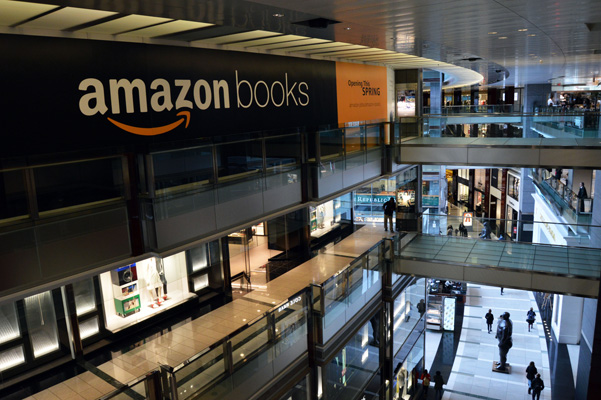
BY JACKSON CHEN | Amazon — which for years has posed a mortal threat to bookstores everywhere — is changing up its customary strategy, at least in a handful of cases nationwide. Here in New York City, it’s planning to open its first local brick and mortar book store at 10 Columbus Circle.
In response, local independent bookstores are wary as ever of Amazon, though not necessarily concerned that the move materially alters the competition they already face from the online retail giant.
Media reports of the Seattle-based e-commerce company’s intention to open a physical location in a third-floor vacancy at the Time Warner Center first surfaced last month. Ironically, the site once housed Borders, which closed up shop in 2011 when the company went bankrupt. Now, walls wrapped in Amazon branding promise an opening this spring.
Amazon Books has already opened three West Coast locations — in California, Oregon, and Washington — and is planning stores in Illinois, Massachusetts, New Jersey, and now New York City. According to the company’s website, the offerings in its brick and mortar venues are determined by “curators” based on customer ratings, pre-orders, sales, and popularity. In what is surely intended to promote membership in the Amazon Prime program — which promises reliably speedy delivery of all the company’s offerings — in-store prices available to those members are the same as they would find online.
Since online retailers have swallowed up a majority of retail sales in the book industry, the sentiment toward Amazon among independent booksellers is understandably bitter.
Chris Doeblin, the co-owner of Book Culture with three branches on the Upper West Side, makes no effort to mask his distaste for the online retailer and its tight grip on the book market.
“A holistic view has to be taken on how we live,” he said. “Rapaciously supplying most of this industry’s goods at next to no profit is damaging. What you end up creating is a hollowed out industry that isn’t capable of producing the benefit to the public in the long run.”
Doeblin explained that Amazon’s dominance in the market drastically reduces margins for publishers, straining available resources for authors and editors who create new product. The damage Amazon.com has inflicted on local bookstores, he said, has already been done and he and others have little concern about what a brick and mortar location at Columbus Circle will mean for them.
“The store they’re opening is pretty close to us, our store on 82nd and Columbus,” Doeblin said. “But I don’t really anticipate an effect on the sales of our store.”
Across town, Chris Lenahan at the Upper East Side’s Corner Bookstore said a proliferation in the number of bookstores is a good thing overall.
“I’m a big believer in bookstores, and the more we have the better,” Lenahan said. “It’s just a little irritating it’s them.”
The Corner owner said while Amazon’s launch in 1994 had a damaging effect on his store’s sales, its opening a physical bookstore this year probably wouldn’t have a big impact on his sales. Corner Bookstore, Lenahan said, has carved out a loyal clientele that’s attracted to its expertise in books, its service, and the wide variety in its stock.
As perhaps the best known independent bookstore in the city, Strand also enjoys an instantly recognizable brand — though on a larger scale — through a similar formula of better book offerings and informed curating of its stock. Outside of its main outpost at 828 Broadway in the East Village, Strand has two kiosks uptown — in Times Square and near Grand Army Plaza at Central Park’s southeast corner — that operate like pop-up shops tailored to the area’s readers.
“I think that’s something you’re going to find with booksellers who are passionate and will advocate for the books we believe in and love,” Whitney Hu, Strand’s communications director, said. “If [customers] are looking for that community vibe, that’s something independent bookstores can offer more so, that sort of custom vibe that’s harder to replicate with brick and mortars across the US.”
With tried and true formulas, independent bookstores are not worried about how Amazon Books opening up a retail store may affect them, but Hu offered an insight into why the online retailer may be looking to break into East Coast markets with physical locations.
“I think people recognized they’re absorbed with their phones, and the opportunity to step back and read fosters some grounding,” Hu said, pointing to a recent upward tick in the paperback market. “There’s something about browsing, the experience and a physical presence that people still seek, and Amazon is probably interested.”
According to the most recent annual report from the Association of American Publishers, paperback sales last year grew for the second year in a row, while retail sales in stores increased 1.8 percent, from $4.08 billion to $4.15 billion.
Still, the AAP’s numbers demonstrate the dominance that online retail sales have achieved, with their total nearly 42 percent higher than sales in brick and mortar locations.
But Book Culture, Corner Bookstore, and Strand don’t expect Amazon Books’ new Columbus Avenue store to poach any of their sales. In fact, there may be a silver lining, as Doeblin noted, with more bookstores serving essentially as billboards to draw greater public attention to what’s new in the publishing world.
The city’s local bookstores, undaunted by Amazon’s latest gambit, seem ready for a face-off on their home turf.
“From our standpoint, we see this as more of a challenge,” Hu said. “You can win in the online space, but now you’re in New York City. You’re in our home court, and it’ll be interesting to see who’ll reign.”
Amazon did not respond to a request for comment on its plans for Columbus Circle and beyond.

































